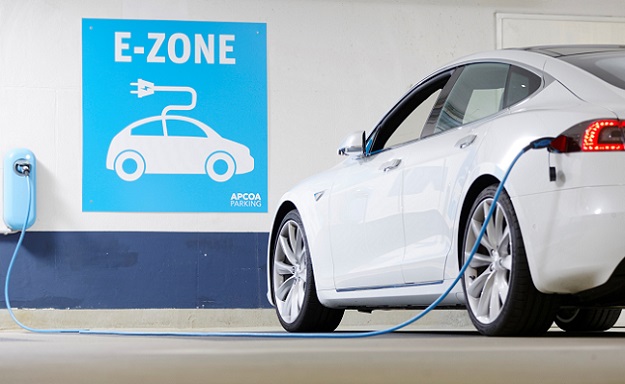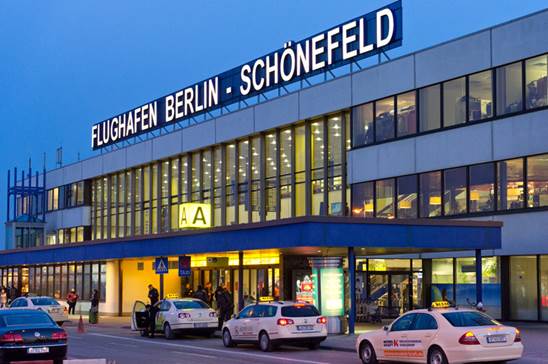Editorial

Dear Reader,
Digitalisation is having an impact on almost every area of our lives – including how we park. For parking space operators, this opens up an entirely new perspective: The development from purely a manager of parking facilities to a provider of mobility service solutions. Multi-storey car parks will develop into intermodal transport hubs in the near future. Operators, road users and service providers can already gain first-hand experience of APCOA’s Traffic Management System and learn how this technical solution can ensure greater efficiency and fairness. The system was recently installed at Berlin’s Schönefeld Airport in October.
You can read much more about the transformation of parking facilities in the digital age and Traffic Management at Schönefeld Airport in this newsletter. I wish you an enjoyable read!
Your Philippe Op de Beeck
Market Report
Transforming multi-storey car parks into mobility hubs

The mobility industry is currently evaluating radical changes to its business models. The industry’s efforts are primarily targeted at developing environmentally-friendly drive technologies, autonomous driving and new usage concepts. In the midst of this evolution, multi-storey car parks will adopt a completely new role. Boasting ample space in attractive locations, they are predestined as hubs for mobility services. However, to exploit this potential to the full, parking space management must undergo a complete digital transformation.Shaping the future of mobility is just as much an issue of infrastructure. Electric vehicles will require car parks with charging stations, autonomous cars will need parking spaces into which they can navigate without drivers, and car sharing will benefit from being able to use intermodal traffic hubs. For car park operators, this is a great opportunity. Whereas previously the only space required was for parking vehicles, in the future car parks will be places where new – and often digital – mobility-related services are provided.But this will require serious investment. The shopping list is as long as it is innovative – charging stations, entry and exit zones, newly designed parking spaces and access routes for autonomous cars, smart charging systems, barrier-free entrances, digital interfaces for customers and convenient options for switching to other transport systems – parking facilities will have to undergo significant changes, and immense upgrades.From an investor's point of view, this is good news. Multi-storey car parks are already regarded as lucrative real estate investments. In the wake of digital transformation, they will experience another significant increase in value as mobility services hubs.
News
APCOA’s Traffic Management System implemented at Berlin’s Schönefeld Airport

Flughafen Berlin Brandenburg GmbH decided to implement APCOA PARKING Deutschland GmbH’s Traffic Management System (TMS) at Berlin’s Schönefeld Airport. The system manages taxis and coordinates the allocation of passengers to specific vehicles according to their individual requirements. This reduces waiting times and enhances the quality of taxi services.
Using an algorithm developed by APCOA, the TMS is able to control traffic flows in such a way that consistent arrival and departure frequencies for taxis at the airport are guaranteed, even during peak periods. APCOA has many years of experience of operating its Traffic Management System at airports. At Stockholm Arlanda Airport, for example, APCOA’s system has been operating with great success since 2009. Airport operators, taxi services and passengers all share the benefits.
Interview
Taxi drivers appreciate the system’s improved fairness
Following the positive experiences gained at Stockholm Arlanda Airport and other airports, APCOA introduced its taxi management system at Berlin’s Schönefeld Airport in October. Detlef Wilmer, Managing Director of APCOA PARKING Deutschland GmbH, highlights how taxi drivers, passengers and the airport’s operating company are all benefitting from the new system.
Who are the main beneficiaries of a taxi management system?
Actually, everyone. The taxi drivers, passengers and, of course, the airport company itself, because they can make sure that only certified taxi drivers are allowed access to the airport. For safety reasons, such regulations are becoming increasingly important.
What do taxi drivers gain from the system?
Taxi drivers can now leave the holding area for short periods of time – to refuel or wash their cars while they are waiting – without having to rejoin the back of the queue. There is also the option of setting a grace period for taxi journeys, which will eliminate one of the main concerns of drivers: short-distance journeys. What every driver wants most, after a long wait, is a passenger heading for a long trip into the city centre. Of course, some passengers are only going to the airport hotel around the corner. At Stockholm Arlanda Airport, our system lets taxi drivers register their return to the holding area within a defined period of time, which means they can return from a short journey and rejoin the queue in a favourable position.
What about the customers? How do they benefit?
Our control system ensures that there are always enough taxis available at any time and, as and when requested, large-capacity taxis or taxis that accept credit cards can also be reserved. We also avoid chaos in the boarding zone by ensuring that only the required number of taxis are actually admitted.
Has the taxi management system led to any other important changes?
Yes, I think we should never forget the environmental aspects. After all, taxis no longer have to queue with their engines running, or restart their engines repeatedly. This reduces CO2 emissions. At Arlanda Airport, we have also demonstrated that a reward system can be used to promote the use of taxis with environmentally-friendly drive systems. As a direct result of APCOA’s TMS, the proportion of environmentally-friendly taxis has risen from 16% in 2009 to 84% in 2014. In 2016, approximately 16,000 tons of carbon dioxide emissions were saved.



